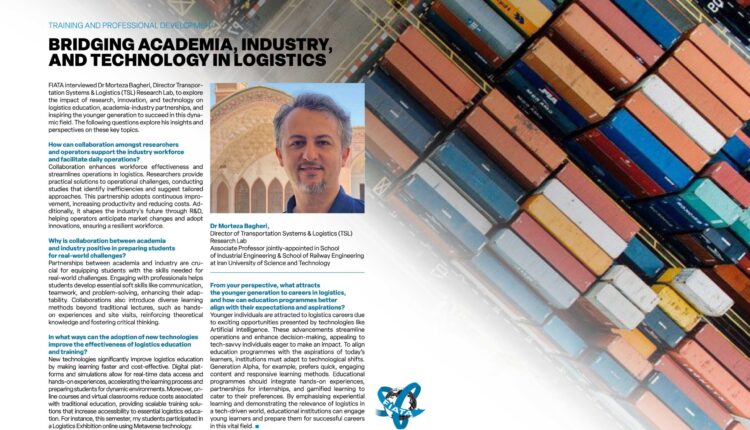Challenges and Opportunities in Logistics Education: FIATA Magazine Interview with Dr. Morteza Bagheri
SEANews – FIATA Magazine Issue 150 (March 2025) Examines New Trends in Logistics Education and Professional Development In its 150th issue, published in March 2025, FIATA Magazine explores new trends in education and professional development in the field of logistics. This issue features an interview with Dr. Morteza Bagheri, Director of the Transport and Logistics Systems Research Laboratory (TSL) and Professor at Iran University of Science and Technology. In the interview, Dr. Bagheri emphasizes the role of research, technology, and academic collaborations in enhancing logistics education and training skilled professionals.
The Necessity of University-Industry Collaboration
One of the key topics in this interview is the importance of interaction between academia and industry in optimizing education and training efficient human resources. Dr. Bagheri highlighted that continuous engagement with industry helps students become familiar with real-world challenges in the field and enhances their practical skills. According to him, this collaboration can be strengthened through internship programs, joint projects, field visits, and industrial training courses.
He also stressed that universities must update their curricula in line with industry needs. In his view, traditional education no longer meets the rapidly evolving logistics landscape, and students need to develop analytical skills, critical thinking, and problem-solving abilities in real-world conditions.
The Role of Research in Improving Logistics Performance
Dr. Bagheri pointed out the significance of research in the field of logistics, stating that academic studies play a key role in optimizing operational processes. He outlined two main benefits of university research in this domain:
- Providing scientific and practical solutions: Researchers can analyze data and identify existing challenges to propose innovative solutions for improving supply chain efficiency and reducing costs.
- Preparing the industry for the future: Through scientific research, the logistics sector can anticipate market changes and train a skilled workforce for the future using advanced technologies.
He added that developing smart logistics systems, optimizing transport routes, leveraging big data, and applying artificial intelligence to supply chain network analysis are some areas where academic research can drive transformation.
Technological Advancements and Their Impact on Logistics Education
In another part of the interview, Dr. Bagheri discussed the impact of modern technologies on teaching methods in logistics. He stated that digital technologies have revolutionized how education and learning take place, creating new opportunities for broader access to high-quality education. Some of the most important technological tools include:
- Digital simulations and data-driven modeling: These tools allow students to experience complex logistics scenarios practically and practice decision-making in real conditions.
- Online courses and remote learning: Virtual classes and online educational platforms enable a wider range of students to access specialized knowledge while reducing educational costs.
- Virtual reality (VR) and the Metaverse in education: Dr. Bagheri shared experiences of his students participating in virtual logistics exhibitions using Metaverse technology, describing it as an effective method for hands-on training in simulated environments.
Attracting the Younger Generation to Logistics
Another key topic in this interview was how to attract younger generations to the logistics and transportation sector. Dr. Bagheri believes that to engage young people, educational programs should be designed according to their characteristics. He identified two crucial factors in this regard:
- The role of advanced technologies: Younger generations are interested in cutting-edge technologies such as artificial intelligence, blockchain, and the Internet of Things (IoT). Integrating these technologies into logistics education can make the field more appealing to them.
- Interactive and gamified learning methods: Generation Alpha and Generation Z prefer learning through interactive games and digital content. Incorporating these methods into educational programs can help attract and retain young talent in the logistics industry.
Recommendations for Improving Logistics Education
At the end of the interview, Dr. Bagheri offered several recommendations to enhance the quality of logistics education, including:
- Strengthening university-industry collaboration through joint educational programs, internships, and applied research.
- Updating curricula to align with market demands and technological advancements.
- Utilizing modern educational technologies such as online classes, digital learning platforms, and virtual reality.
- Developing soft skills such as teamwork, critical thinking, and communication alongside technical competencies.
In this interview, Dr. Morteza Bagheri emphasized the need for a shift in logistics education approaches, highlighting the collaboration between academia, industry, and technology as a key factor in improving education quality and developing skilled human resources. According to him, leveraging modern technologies, designing practical training programs, and enhancing student skills can boost logistics industry efficiency and competitiveness on a global scale.

